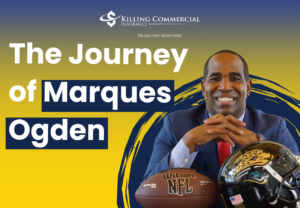
Leveraging old school and new school Techniques in Insurance Sales
The landscape of insurance sales has evolved dramatically in recent years. As technology advances, it becomes essential to blend traditional methods with modern tools to

I hear it all the time, “David, I just don’t believe there are people on every corner waiting to hand out their business to you because you show up.” Yeah, I agree with you; that’s why you have to learn how to answer the question your prospect doesn’t even know they have. That’s how you get hired.
Why do we make this process so complicated? Man, we’re so worried about looking at coverage and forms and endorsements. We try to convince somebody that their agent’s asleep at the wheel and has screwed the pooch. They need to hire you because you came in like a knight in shining armor. You pointed out all of the deficiencies that the incumbent agent made when they placed the insurance program. But my question is, how do you get to that point? I was in an online forum over the weekend, and I saw a producer comment to one of my good friends, Josh Gurley, about how Josh must’ve lived in Fantasyland because there he lives in a place where there are business owners on every corner just waiting to hand him their business. What? Do you believe that, man? Come on. That’s not how it works in the real world, and we all know that.
I ask how you even get to the point to review the insurance because if that’s your lead-in, your game’s hot garbage. You’re never going to get to the point where a client is going to know, like, and trust you. Which are the three things they need to do to be able to buy from you. So my challenge to you is this; if you want to get the audience, and you want to be able to bring the account in, you have to be able to drive doubt, nothing wrong with that, without throwing the other person under the bus, that never looks good. And you drive doubt by answering the question or solving the problem that that prospect didn’t even know they had.
Now, as you know, I like worker’s compensation, which I feel I’m relatively decent at; we have a lot of data around it, so I have a pretty good idea of what an account looks like before I ever walk in the door. So if I see that that account has a higher mod, I may ask a question about things that will lead them to the solution we provide. So an example of that would be, “Talk to me a little bit about your hiring process. Is it formalized?” “Talk to me about onboarding. When you bring someone on, what does that process look like?” “How does orientation go?” “Do you have a learning management system in place? Or how do you train your people?” I don’t want to bring up the learning management system yet; I want to ask them how they train their people because my solution is the learning management system, and I will ask them all these questions about human resources. Why?
I know that workers’ compensation problems start in the hiring process and are only exacerbated as we move down the road, I may ask, “Out of curiosity, how complicated is it for you to complete the monthly spreadsheet to ensure that you’re not going to have a huge audit at the end of the year?” What did I do? I asked them how complicated it was, assuming they even had one while knowing they didn’t, and I created doubt because they knew they didn’t have that. And by me just matter-of-factly mentioning it to them, they think they’re missing out on something. And FOMO is an excellent motivator for people to take the next step. Fleet safety is no different; cybersecurity is no different.
You can literally sit down, and I challenge you to do this, sit down with the type of coverage that you want to recommend, or sit down with the perceived problem that you think an organization has, and then list out the question, not to get to the answer of whether or not they have a problem, but to lead them to you talking about a solution that you use with all of your clients. And then they’ll realize they’re not getting it and have a problem. So an example of that would be, “Well, the reason I ask about your training is because when we bring a new client on and we’re creating the customized learning management system for their team, we always want their input as to what training they think is most effective, and we combine that with the loss data to make sure that we have the most efficient use of their team members’ times.”
The beautiful part about this is that we document everything on the cloud. As a result, we have an ongoing record in real time of all employees who have been trained on the subjects. When we’re ready, we can print this stuff out as a transcript. Then include it as a material part of our submission to the underwriters. They will insure your company, and we always get the best result because we’ve told the whole story. See what I did? Ask them a question. They likely have training that they pencil-whip or that’s on hard copy paper. It’s not done with any consistency or regularity. It certainly doesn’t have automatic reminders to the team. And that allows me to talk about Mineral, a great solution we use in our agency to solve the problem that that client didn’t know they had, or maybe they knew they had it and didn’t emphasize it.
So if you can practice that, look at the end game and figure out how to ask questions to lead your witness there. If you’re an attorney, get them to where you want them to be. They’re going to conclude on their own. And that’s always going to be more powerful for you. To be a trusted advisor, people must know, like, and trust you. And the best way for you to do that is to educate them and demonstrate your intelligence in the process. If you could step away from the policy and towards solving the problem, you’re going to kill it in commercial insurance.

The landscape of insurance sales has evolved dramatically in recent years. As technology advances, it becomes essential to blend traditional methods with modern tools to

In today’s competitive insurance market, being a successful producer requires more than just industry knowledge. It demands a strategic mindset and a proactive approach. This

In our latest podcast episode of The Power Producers Podcast, I had the privilege of sitting down with Marques Ogden, a former NFL player turned

Introduction In today’s fast-paced digital world, closing deals through online education has become a crucial strategy for businesses, particularly in the insurance industry. By leveraging

The landscape of commercial insurance is evolving, and one area that has garnered significant interest is the utilization of Professional Employer Organizations (PEOs) and payroll

Building and Leveraging Referral Networks for Insurance Producers Introduction In the competitive world of commercial insurance, building and leveraging referral networks can be a game-changer for
There was a problem reporting this post.
Please confirm you want to block this member.
You will no longer be able to:
Please note: This action will also remove this member from your connections and send a report to the site admin. Please allow a few minutes for this process to complete.

Responses